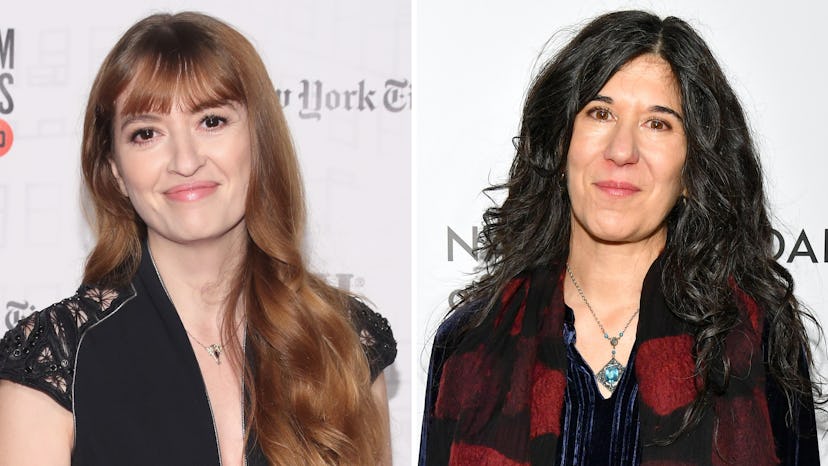Marielle Heller and Debra Granik Were Completely Unsurprised by Their Oscars Snubs

What do the directors Marielle Heller and Debra Granik really think about being snubbed by the Oscars? As they shared during a conversation at the Wing co-working space in New York last week, they weren’t exactly surprised.
Heller directed the Melissa McCarthy–led Can You Ever Forgive Me?, which scored Oscar nominations for McCarthy and her costar, Richard E. Grant; the film’s screenwriters Nicole Holofcener and Jeff Whitty also received a nomination for best adapted screenplay. The director, however, has been noticeably left out of the conversation, as Heller was snubbed in the nominations at both the Oscars and the Golden Globes. Similarly, Granik, who directed Leave No Trace, about a father and daughter living in the forest together, has also been overlooked for directing nominations this award season. (Granik also adapted the screenplay, with Anne Rossellini, from a book called My Abandonment.)
Both of the films and their respective stars have been praised by critics, while their accomplished directors have been rebuffed, not only by the mainstream award ceremonies that didn’t dole out nominations for their work but seemingly by their peers as well. “This was an incredible year for women filmmakers. A lot of us made really worthy movies,” Heller said, before adding, “But that was our undoing. There were too many of us, and the world doesn’t know how to handle more than one good female director at a time.”
Granik echoed the sentiment, comparing social change to a rubber band. “You stretch it, and then it snaps back, because it got uncomfortable stretched. Stretching is uncomfortable,” she said. “I don’t know. All of a sudden, society was in downward dog, and the hamstrings are stretching, and then you crumble back into child’s pose.”
Even the word “snub” doesn’t sit right with the directors. “‘Snub,’ forget that word. ‘Snub’ makes it sound like it’s personal, excluded. ‘Snub’ is a dumb word; that’s a word out of old Hollywood,” Granik said. “It’s a word that can only be associated, I think, with vanity. I think ‘empirical exclusion’ is more of, I think, what we’re talking about.”
It should be common knowledge that only one female filmmaker has won an Oscar for best director: Katherine Bigelow, for The Hurt Locker, in 2010. In 2018, Natalie Portman took the stage at the Golden Globes and spoke out against the lack of female directors nominated at the ceremony. Yet in 2019, once again, not a single female director was nominated for a Golden Globe, nor were any of the films nominated for best picture at the Oscars directed by women.
The Golden Globes have already come and gone, and the Oscars may be a total mess this year, but these ceremonies are still good barometers of the politics of Hollywood, especially when filmmakers like Vice’s Adam McKay or A Star Is Born’s Bradley Cooper, a first-time director, have been placed at the forefront of the discourse concerning the future of cinema, often concerning themselves with placing their stamp of authorship all over the films they directed. It’s also worth noting that Lady Gaga, the titular star of A Star Is Born, has continually pinned the majority of the film’s success on Cooper, even though she is the one who really carried the film, and even while Cooper admitted that he felt “embarrassed” to be snubbed by the Academy for a best director nomination.
The women who made some of the year’s most critically acclaimed films are less embarrassed to be overlooked, and more incensed by the fact that they had low expectations (if any at all) of being nominated in the first place. During last week’s discussion, Heller also added that most people don’t seem to even understand the fundamentals of a director’s job (hint: It’s not all about coordinating explosions or hulking shots). “If I had gone into this awards campaign going, ‘I made this movie. I did this. I created these performances, I created this chemistry, I brought them together, I cast Richard E. Grant, I cast Melissa McCarthy. I brought them together. I did this. I found all of these things. This was what I did, this was what I did, this was what I did,’ maybe I wouldn’t have been separated from the story of movie in the way that I have been,” Heller said. “But how would I have slept at night?”
Of course, the director of a film is responsible for bringing together the experts across the various sub-disciplines of the filmmaking process—the actors, the costume designers, the set designers, the editors, and more—into one cohesive production. Heller, therefore, made a salient point about the fact that while she became separated from Can You Ever Forgive Me?, she never sought to take ownership and authorship over the entire project without highlighting the fact that filmmaking is a team effort—unlike some directors who have been so outspoken about being intrinsically attached to and in charge of every step of development for their nominated projects.
There’s a reason the Time’s Up initiative recently issued a “4 percent challenge,” which urges Hollywood’s biggest studios—like Universal Pictures and MGM—to hire at least one project with a female director attached to it within the next year and a half. Women make movies, and last year some of the most critically acclaimed films were created by women, but when only 4 percent of the highest-grossing films are made by women, the projects don’t get the support they need, nor the accolades they deserve.
Related: Bel Powley Stars as the Last Woman on Earth, Directed by Marielle Heller